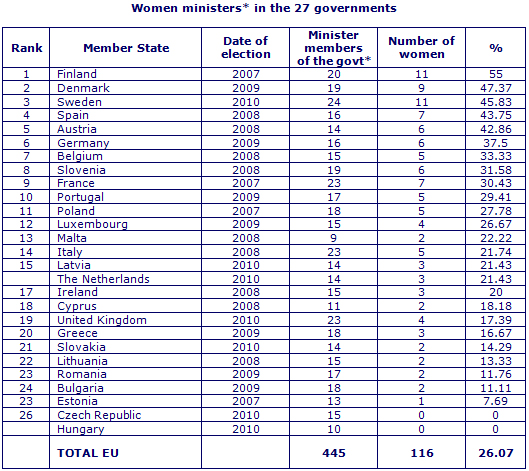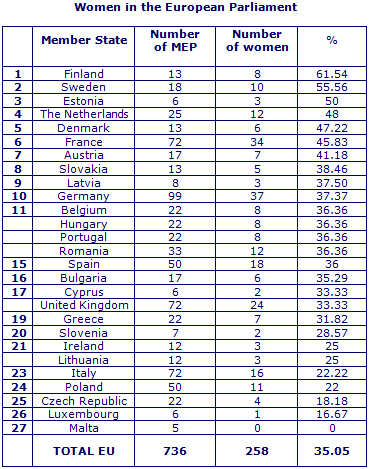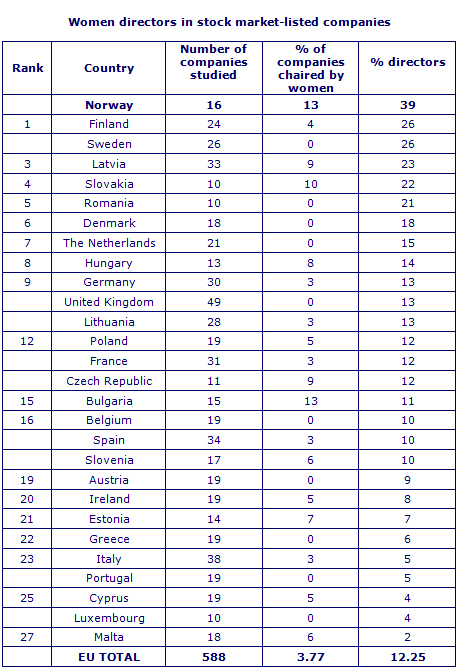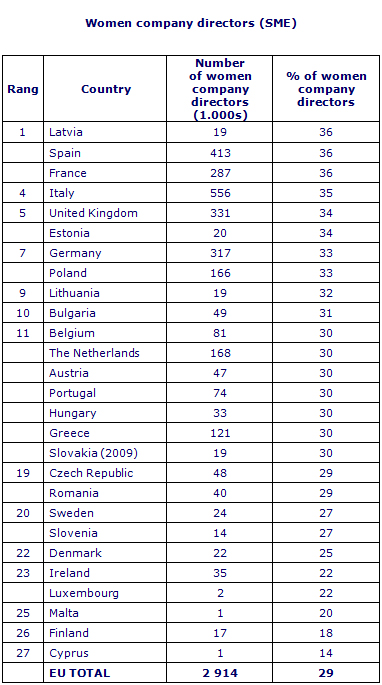Gender equality
Pascale Joannin
-
Available versions :
EN

Pascale Joannin
Women in economic life
Women have gradually conquered every professional sector worldwide.
More and more women are working; in the European Union, for example [2], an average of 62.5% women is working. However, 31.2% of them work part time, that is a percentage that is four times higher than amongst men. Moreover, with equal qualifications women are still too often less well paid than men (average gap of 17.8% in the Union), which is real discrimination.
Women are also more highly qualified than men, they achieved 58.9% of the degrees from universities in the European Union last year. Although highly qualified and coming onto the employment market in increasing numbers, women still remain in the minority in managerial positions in companies or the world of politics, particularly at the highest level.
On average 33% of women hold positions of responsibility in the Union. In banks a study shows that only 5 of them had, on 30th September 2010, a percentage of women close to or over 30% [3]. The Bundesbank, the German Central Bank appointed on 23rd February, for the very first time, a woman, Sabine Lautenschläger-Peiter to be a member of its board.
Amongst the largest stock-market listed companies, there is an average of 12% of women (26% in Sweden and Finland) sitting on the management boards or supervisory committees of European companies and only 3% are chairs of these boards (13% in Bulgaria). Only Norway has almost 40% thanks to a law passed in 2004. On 27th January 2011 [4] France passed an equivalent law. And other countries may follow, such as Germany [5] or the UK [6] for example. Even the European Union [7], by way of Jerzy Buzek, President of the European Parliament and Viviane Reding, Vice-President of the European Commission considering this.
Because the Charter of Fundamental Rights, published on 30th March 2010 in the Journal Officiel of the EU stipulates in article 23 that "Equality between men and women must be ensured in all areas, including employment, work and pay. The principle of equality shall not prevent the maintenance or adoption of measures providing for specific advantages in favour of the under-represented sex." It might therefore be quoted by anyone who believes that gender equality is not being respected.
It would now seem as if we have reached a turning point because many studies show all the advantages there are in having more women on management teams and boards.
Thus, according to a study undertaken by the World Economic Forum [8], of the 10 countries where the place of women is best assured and where therefore life is best, 7 are in Europe and 4 are EU Member States (Finland, Sweden, Ireland and Denmark).
In its report entitled "More Women in senior position : key to economic stability and growth" [9] the European Commission considers that the economy would gain from both women and men being duly represented in top level positions and shows that there is a positive link between the proportion of women in positions of high responsibility and company results.
Finally, on 1st January 2011 the UN created an agency for sex equality and the autonomy of women, [10] directed by the former president of Chile, Michelle Bachelet.
It would appear, therefore, that women's time has finally arrived.
Women in political life
In the parliaments that are supposed to represent the population as a whole, women are still under-represented: according to the Interparliamentary Union (IPU) [11] on 31st January 2011, of the 45 668 members in parliaments worldwide (including both lower and upper chambers), only 8 674 are women, that is a proportion of 19.2%.
The European Union (24.2%) is ahead of the Americas (22.4%), other European countries (20%), Sub-Saharan Africa (19.3%), Asia (18.3%), the Pacific States (12.6%) and Arab countries (12.5%).
With regard to the number of women elected in Parliaments, European countries hold 6 of the top 10 places in world ranking. According to the IPU [12] on 31st January 2011, of these 6 countries, 4 were Member States of the EU (Sweden, the Netherlands, Finland, Belgium).
In terms of the number of women who preside one of the chambers in Parliament, of the 38 women listed by the UIP [13] on 31st January 2011, 14 are Europeans, 10 of whom are from EU Member States (Austria, Bulgaria, Estonia, Germany, Latvia, Lithuania, the Netherlands, Czech Republic, Romania and the United Kingdom), 9 are from African States, 5 from American States, 6 from the Caribbean Islands and 4 from Asian States. Women only represent 14% of the leaders of Parliament.
Since 1st January, the average percentage of women in Parliaments in the European Union is 24.22%.
In governments, women represent on average, on 28th February 2011 in the European Union, 26.07% of ministers. Finland is the only country with more female than male ministers (55%). Two European governments do not include any women at all: Hungary and the Czech Republic.
8 women are currently Prime Minister in their country, of whom 5 are in Europe – 3 in the EU (Germany, Finland, Slovakia), Croatia and Iceland -, 1 in Australia, 1 in Bangladesh and 1 in Trinidad and Tobago.
10 women are Presidents, including 4 in Europe (Ireland, Finland, Lithuania, Swiss Confederation), 1 in Argentina, 1 in Brazil, 1 in India, 1 in Liberia, 1 in Costa Rica and 1 in Kyrgyzstan.
 Source : Fondation Robert Schuman © -
Source : Fondation Robert Schuman © -
* N.B.: The Prime Minister has been counted but not Secretaries of State.
In the European Parliament, whose role and powers are on the increase, specifically with the Lisbon Treaty, women chair 9 committees and 8 delegations. 6 are vice-chairs and 2 are quaestors. They have a much greater presence in the European Parliament (35.05%) than in national Parliaments (24.22%). Only 1 Member State (Malta) has not sent any women to the European Parliament.
 Source : Fondation Robert Schuman ©
Source : Fondation Robert Schuman ©
Women are gradually entering political and economic bodies. The move is of course still only relatively timid and incentive measures are needed to encourage the trend. Mentalities and education must be changed, and that will take time. However, if the movement is not increased deliberately, it will be inevitably or under the demands of necessity. Because qualified and capable women are ready - and willing - to take up the challenge. It would be wrong to deprive ourselves of their know-how and talents.
The decade now beginning, and this 2nd decade was indeed important in both the 19th and the 20th centuries, could well be the decade when women gain access to key positions in every sector of activity, because the 21st century is the century that will see the advent of women's power.
[1] Cf "Schuman Report on Europe, 2011, the State of the Union". Springer Verlag, Paris, March 2011
[2] http://eur-lex.europa.eu/LexUriServ/LexUriServ.do?uri=COM:2010:0491:FIN:FR:PDF
[3] http://www.globewomen.org/CWDI/tOP%20bANKS%20(w).pdf
[4] http://www.legifrance.gouv.fr/affichTexte.do?cidTexte=JORFTEXT000023487662&dateTexte=&categorieLien=id
[5] . Voir aussi la désignation le 15 février dernier d'une femme chez Daimler http://www.daimler.com/dccom/0-5-7153-1-1368502-1-0-0-0-0-0-9293-7145-0-0-0-0-0-0-0.html
[6] http://www.bis.gov.uk/assets/biscore/business-law/docs/w/11-745-women-on-boards.pdf
[7] http://www.nytimes.com/2011/03/01/opinion/01iht-edbuzek01.html?_r=1&scp=1&sq=buzek&st=cse
[8] http://members.weforum.org/pdf/gendergap/report2010.pdf
[9] http://bookshop.europa.eu/is-bin/INTERSHOP.enfinity/WFS/EU-Bookshop-Site/fr_FR/-/EUR/ViewPublication-Start?PublicationKey=KE3109271
[10] http://www.unwomen.org/fr/2011/01/un-women-begins-its-work/
[11] http://www.ipu.org/wmn-f/world.htm
[12] http://www.ipu.org/wmn-e/classif.htm
[13] http://www.ipu.org/wmn-f/speakers.htm
Publishing Director : Pascale Joannin
On the same theme
To go further
Climate and energy
Valérie Plagnol
—
22 April 2025
Freedom, security and justice
Jean Mafart
—
15 April 2025
Asia and the Indo-Pacific
Pierrick Bouffaron
—
8 April 2025
Democracy and citizenship
Radovan Gura
—
25 March 2025

The Letter
Schuman
European news of the week
Unique in its genre, with its 200,000 subscribers and its editions in 6 languages (French, English, German, Spanish, Polish and Ukrainian), it has brought to you, for 15 years, a summary of European news, more needed now than ever
Versions :







